Behavioural Insights (Spring 2020)
By now, most leaders recognize that both social and psychological factors affect nearly every decision people make — and that therefore, these factors affect every organization and the economy as a whole. In this issue, we seek to expand your understanding of human behaviour and decision processes and show how these insights can be harnessed to achieve your goals.
Preview This Issue
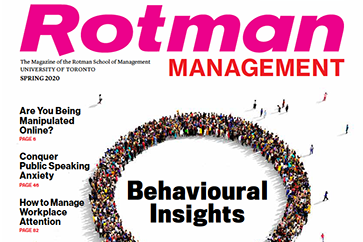
Purchase This Issue
Due to their timeless themes, Rotman Management issues remain relevant long after publication.
Buy a Digital Copy:
Zinio | Apple Store | Google Play
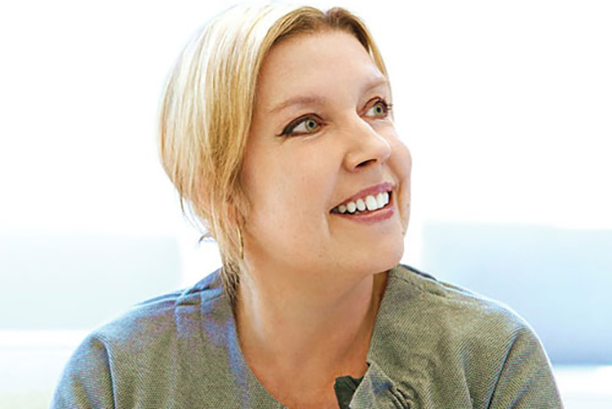
Editor's Letter
AT ITS CORE, every organization is really in the same business: behaviour change. Businesses try to convince consumers to switch to their products, healthcare organizations try to....
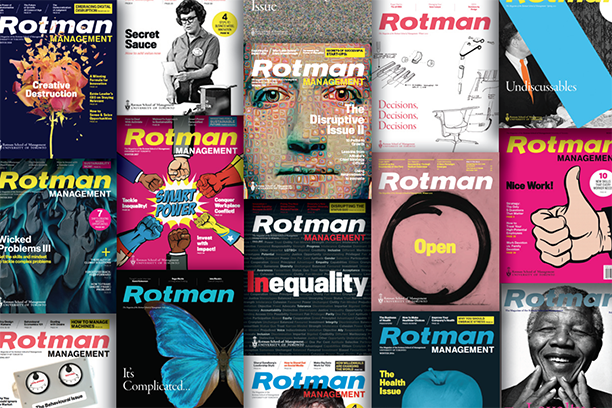
Subscribe Today
Rotman Management magazine is your destination for exclusive thought leader interviews, breakthrough research from leading academics, and innovative new ideas from top management thinkers.
Feature Articles From this Issue
Feature articles from Rotman Management magazine can be purchased individually as PDF documents.
Click on any title to proceed to the purchase page at hbr.org.
 |
(FREE) Sustainable Finance: A New Era Begins
Interview with Tiff Macklem by Karen Christensen
Rotman School Dean Tiff Macklem discusses the findings of the Canadian government’s Expert Panel on Sustainable Finance, which he chaired.
|
 |
(FREE) Beyond Willpower: Cognitive Strategies for Self-Control
by Angela Duckworth, Katherine Milkman and David Laibson
People with greater self-control fare better in terms of important dimensions of human flourishing. Here’s how to join their ranks.
|

|
(FREE) Defaults Are Not the Same — by Default
by Jon Jachimowicz, Shannon Duncan, Elke U. Weber and Eric J. Johnson
When introducing defaults into real-world environments, choice architects need to be mindful that defaults can have varied responses.
|

|
(FREE) Gender Diversity and Inclusion in Medicine: Lessons from Management
by Sonia Kang and Sarah Kaplan
Despite increasing representation, five myths are still leading to discrimination against women in medicine — and across industries.
|

|
The Behavioural Science of Online Manipulation
by Elisabeth Costa and David Halpern
Organizations have two choices: exploit human biases or ‘nudge for good’. The latter will shape the evolution of the digital world — and build fairer, better markets.
|
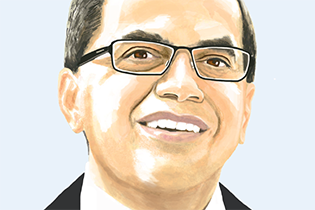
|
Thought Leader Interview: Dilip Soman
by Karen Christensen
The Rotman School’s resident behavioural expert talks about the pressing need for organizations to understand human behaviour and how ‘sludge’ gets in the way of value creation.
|

|
Choice Architecture 2.0: The Critical Role of Sensemaking
by Job Krijnen, David Tannenbaum and Craig R. Fox
Choice architecture is less effective when decision-makers consider the intentions of the choice architect.
|

|
Mastering Difficult Conversations: Interview with Douglas Stone and Elaine Hering
by Karen Christensen
Just about every day, we attempt (or avoid) difficult conversations. Two experts on the topic provide some coaching.
|
 |
How to Conquer Public-Speaking Anxiety
by Amanda Tobe and Tatijana Busic
Public speaking is a commonly dreaded human fear. It is one of the top sought-after competencies by organizations worldwide.
|

|
The Paradox of Passion: How it Helps You Succeed — and How it Can Backfire
by Stéphane Côté
People who achieve the highest levels of success are often said to be passionate about their work. This sentiment is both exactly right and only half of the story.
|
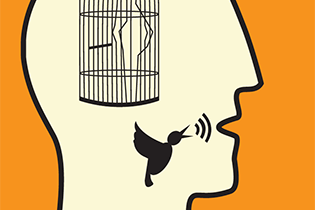
|
The Science of Speaking Up
by Michaela Simpson, Khalil Smith and David Rock
Although conventional wisdom says that ‘if you see something, you should say something’, in reality most people keep their mouths closed. Here’s what to do about it.
|
 |
Behavioural Science: The Answer to Innovation?
by Kelly Peters
Behavioural Science is leading the charge to provide innovators with a long-overdue method to tackle their problems — in a way that is measurable, observable and testable.
|

|
Managing Your Most Precious Resource: Organizational Attention
by Paul J.H. Schoemaker and George S. Day
Being aware of decision biases due to cognitive, emotional and social factors is critical in managing people’s attention.
|